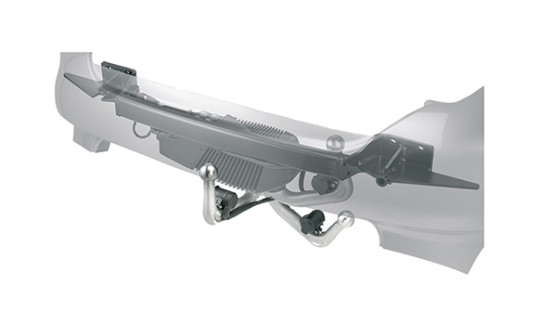
Westfalia's History
From the inventor of the towbar to today
For decades, towbars, bike carriers, trailers and motorhomes from Rheda-Wiedenbrück have been popular products for leisure, holidays, hobbies and business. You could say that Westfalia has been moving people's lives - since 1844. Today, Westfalia consists of two companies: Westfalia-Automotive GmbH and Westfalen Mobil GmbH. Both have their origins in the former Westfalia-Werke company, but today they are legally and financially independent.
While Westfalen Mobil GmbH is expanding its business with motorhomes, Westfalia-Automotive GmbH's core business includes towbars, wiring harnesses, coding systems and bicycle racks. The Westfalia brand is a synonym for quality, reliability and innovation. With Westfalia-Automotive products, you can turn every day into an adventure.
FROM A FORGE TO A GLOBAL PLAYER
In 1844, Johann Bernard Knöbel laid the foundation for what is now "Westfalia-Automotive GmbH" by starting a forge in Wiedenbrück,...
FROM A FORGE TO A GLOBAL PLAYER
In 1844, Johann Bernard Knöbel laid the foundation for what is now "Westfalia-Automotive GmbH" by starting a forge in Wiedenbrück, Germany. Initially, agricultural tools and wagons were repaired and built here. In 1876, the first wagon was produced. When his son Wilhelm took over the business, the other son, Franz, inherited the house and tools to start his own venture.
In the summer of 1887, Franz Knöbel opened a new company manufacturing harnesses, wagons, hunting carriages, and sleighs. In 1918, the self-propelled wagon he developed became a great success. The name "Westfalia" appeared in the trade register for the first time in 1922, and the first open trailers were built from 1927 onwards.
The next generation of the Knöbel family, consisting of Franz, Hans, and Gerhard, took over the company management in 1933. They expanded the production of trailers, and in 1931 Franz Knöbel developed the tow ball, inspired by the sleeve of a chicken bone. This towing coupling for vehicles and trailers was so revolutionary that it remains unsurpassed to this day. This makes Westfalia the inventor of the tow bar.
In 1952, the production of camping equipment for the VW transporter was added to the production of trailers and tow bars. This marked the birth of a new product: the motorhome, which made Westfalia known worldwide. This was followed by the production of caravans, hearse and horse trailers, the construction of the driver’s cabin for the Mercedes-Unimog, the small van Fridolin (VW Type 147), the introduction of the track-stabilizing coupling SSK, and the expansion of motorhome manufacturing for Mercedes and Ford as well.
In the early 1960s, cousins Horst (son of Hans Knöbel) and Werner (son of Gerhard Knöbel) took over the helm. In 1966, the first detachable tow bar (nut system) was introduced to the market. The one millionth tow bar rolled off the assembly line in 1970. Other innovations followed: the fully automatic tow bar was launched in 1987 (A40V), and in 1995 the world’s first aluminum tow bar was introduced.
In 1999, the Knöbel family era ended, and Westfalia-Werke GmbH & Co KG was divided by production areas. This led to the formation of Westfalia-Automotive GmbH, a manufacturer of tow bars and matching electrical kits, Westfalia-Mobile GmbH (motorhome equipment), and Westfalia-Trailer-Group (trailer construction). In 2002, Westfalia-Automotive GmbH was the first company to supply an electrically retractable tow bar for assembly line production. In 2008, the self-developed foldable bike carrier ("Portilo") was introduced to the market.
In the following years, tow bar manufacturers Monoflex from Sweden and Siarr from France were acquired, contributing to the expansion of our product range. Subsidiaries were also established in Italy, Poland, Russia, and the United Kingdom. Our portfolio now includes tow bars for approximately 800 vehicle types, and Westfalia-Automotive holds a 40% market share in Europe. We supply products to almost all vehicle manufacturers for assembly line installation (OE), as well as to wholesalers and retailers for the aftermarket. Innovative products like the retractable tow bar and Trailer Towing Assistant (TTA) are proof of the company’s highly innovative strategy.
In 2016, Westfalia-Automotive became part of the American Horizon Global Corporation, one of the leading global providers of trailer and transport systems. This marked the beginning of an even more global focus for the company, which since 2023 is part of the American First Brands Group.
Currently, our 700 employees manufacture 1 million tow bars per year, and the company is striving for further growth. Our engineers are already developing a multitude of new innovations that will ensure the company's future success.
Read More Read Less
The milestones in our 180-year history can be found below in words and pictures.

1844 - Founding of a smithy

1932 - Invention of the towbar

Manufacturing in the early 60s

1966: Launch of the first detachable towbar

1987: Launch of the A40V automatic detachable towbar

1999: Foundation of Westfalia-Automotive GmbH

2002: First electric retractable towbar ("Nessy") in serie's production

2006/07: Acquisition of Siarr (FR) & Monoflex (SE)

2008: Launch of the "Portilo" bike rack

2012: 7 times in a row "Best Brand" in the towbar sector by "AMS" magazine

2015: Launch of "Trailer Towing Assistant-TTA" for Audi Q7
